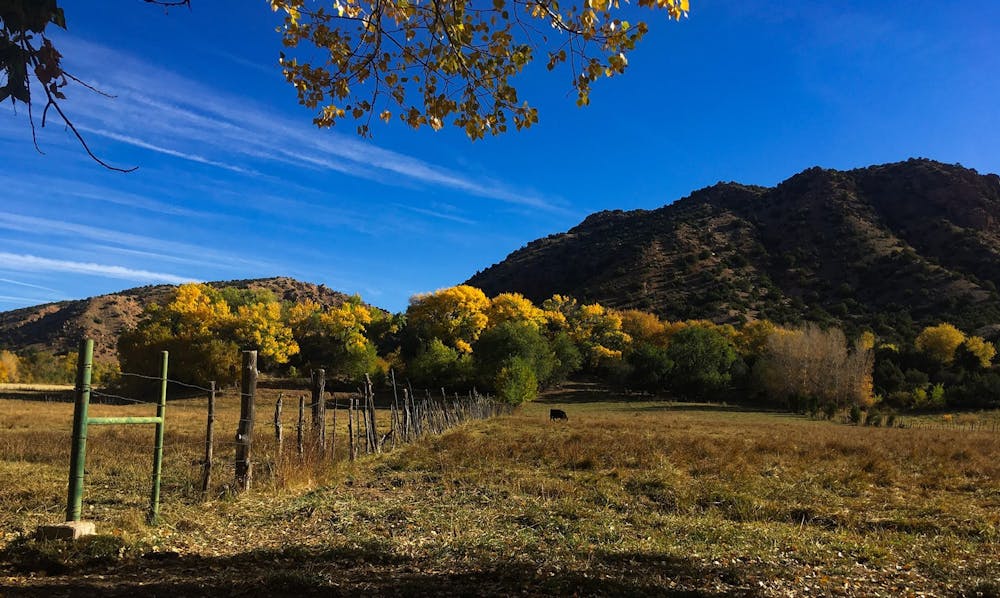If you’ve spent time in New Mexico, chances are you’ve met somebody with a Spanish last name who doesn’t speak a lick of the language. If you ask about their background, they might just say they’re Hispanic without mentioning a connection to any specific Spanish-speaking region.
I’ve been one of these people. Growing up in Albuquerque, I never felt the need to elaborate any further than “Hispanic” when describing the ethnicity of my mom’s side of the family, and it wasn’t often that people inquired any further.
I first felt challenged about my identity when I was 18 and filling out a college application. I expected my usual routine of checking “white” for race and “Hispanic/Latino” for ethnicity. But this application required me to input my specific background. The options were Cuban, Mexican/Chicano, Puerto Rican, Latin American and “other.”
I had to text my mom to figure out which box to check.
“Of Spanish origin. I.e. from Spain,” she wrote.
I could’ve sworn this wasn’t quite the case. After a quick and confusing phone call with her, I checked the boxes for “other” and “Mexican/Chicano,” not entirely understanding what that meant for us.
It wasn’t until I left the state that I learned this widespread misunderstanding and disconnect from our Hispanic roots is a pretty uniquely New Mexican experience.
For my freshman year of college, I went to a predominately white institution on the east coast. I do benefit from white privilege — I inherited my Anglo dad’s German last name and many of his physical features — and never experienced the racism that Hispanic and Latino communities often face.
Living outside of New Mexico, I found myself having to explain my identity more often. This prompted me to do my own research on New Mexican history and my ancestry.
To sum up a complicated history: Spanish colonization included the areas that are now known as Mexico and New Mexico. There, Spaniards mixed with Indigenous populations. Their mixed-race descendants — and the “stereotypical” image of what constitutes a Hispanic or Latino person — were known as mestizos, according to the “Journal of Linguistic Geography.”
Part of this area became known as Mexico, which then included present-day New Mexico. The mestizo populations that lived in now-New Mexico were Mexican. When the United States took possession of New Mexico in the 1800s, its residents were given the choice of moving further south to Mexico or staying where they were, according to the University of Houston.
My ancestors stayed in their town just south of Albuquerque called Belén, where I spent a lot of time growing up. Those who stayed were pressured to conform to white and non-Hispanic — or Anglo — society. They started associating more with their European side and identifying strictly as Spaniards.
Get content from The Daily Lobo delivered to your inbox
Still though, their language was looked down upon, and they stopped teaching their kids Spanish because they could be punished for speaking it.
My grandma is the last person left in my immediate family who fluently speaks Spanish.
I now understand why my mom identifies as a Spaniard. The term “Hispanic” encapsulates all Spanish-speaking populations, including Spain. I started to feel more comfortable identifying as “Latina” — a term that encapsulates people from all of Latin America but not Spain. I still felt a disconnect, however, especially because I don’t speak Spanish.
A few months after doing my research, an Anglo peer called me “Miss Latina with no fucking evidence.”
It isn’t my fault that my grandparents didn’t pass down the language to my mother, or that they even felt the need to let the language and identity die with them in the first place. They were forced to assimilate and drop all “evidence” of their Latinidad, and now I was experiencing the effects.
I educated my peer and continued to do more research. I found that “Chicano” is a term for people of Mexican descent born in the United States. People from New Mexico who identified as Hispanic — or sometimes Hispano or Nuevomexicano — played a big role in the Chicano movement in the 1960s, according to History.
I now find that “Chicana” best encapsulates my identity, while many of my family members continue to identify as just Hispanic.
A few months ago, though, I spoke with my uncle. He told me his biggest regret in life is never learning Spanish fluently because of assimilation.
This was the first time in my adult life that I’ve felt connected to my own identity through a family member who cares about preserving our culture and understanding our history. He told me something that I’d never heard a family member say out loud, which gave me hope about the validation and preservation of our identity.
“You’re Mexican American,” he said. “Don’t forget that.”
Lauren Lifke is the managing editor for the Daily Lobo. She can be reached at managingeditor@dailylobo.com or on X @lauren_lifke
Lauren Lifke is the managing editor for the Daily Lobo. She can be reached at managingeditor@dailylobo.com or on Twitter @lauren_lifke






